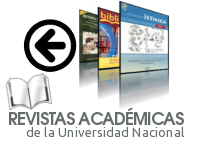Business training experience of entrepreneurial students UNA-UNED and civilian population 2020-2022
DOI:
https://doi.org/10.15359/udre.13-2.4Keywords:
Rural entrepreneurship - Business training - Pandemic - Strategies - Students - Rural areas - civilian population., Rural, entrepeneurship, business, training, pandemic, strategies, students, rural, areas, civilian, populationAbstract
Entrepreneurship has been established as a mechanism through which people create their own sources of income and thereby contribute to the development of the communities where they offer products or services. This document sets out the strategies taken into consideration to comply with the UNA/UNED Business Training project, aimed at student entrepreneurs and civil society during 2020-2022 in the Region Brunca. It is developed through a systematization of the experience of the process that was developed during the period of the COVID 19 pandemic, a context that changed the way of carrying out daily activities. The situation experienced reflected the need for greater preparation of entrepreneurs in terms of skills in the technological field, digital marketing, strategic alliances, and adequate business preparation. Within the results obtained, it was possible to identify the need for these initiatives to have appropriate resources in terms of knowledge of tools that allow them to manage improvements in the area of operation, strategies and business linkage.
References
Baron, R. A. (2007). Behavioral and cognitive factors in entrepreneurship: Entrepreneurs as the active element in new venture creation [Factores conductuales y cognitivos en el emprendimiento: los emprendedores como elemento activo en la creación de nuevas empresas]. Strategic entrepreneurship journal, 1(1-2), 167-182. https://doi.org/10.1002/sej.12
Camelo-Ordaz, C., Franco-Lear, N., y Sousa-Ginel, E. (2018). El reconocimiento de oportunidades emprendedoras en las spin-off académicas españolas. ICE, Revista de Economía, (904), 123-138.
https://pdfs.semanticscholar.org/f6c2/81edd70c411c103536c63303a708e393c16a.pdf
Castillo, E. (2018). Manual metodológico de uso práctico. UNED.
Fernández, M., Chamizo, R., y Sánchez, S. (2021). Universidad y pandemia: La comunicación en la educación a distancia. Ámbitos. Revista Internacional de Comunicación, (52), 156-174
https://dx.doi.org/10.12795/Ambitos.2021.i52_10
Hernández-Sampieri, R., Fernández-Collado, C. y Baptista-Lucio, P. (2014). Metodología de la investigación (6.a ed.). McGraw-Hill.
Jiménez, S. (2022). Investigación y recogida de información de mercados (2a ed.). IC Editorial.
Messina, M., González, S., Mari, J., Castro, R., Rivas, A., Pena, J., y Rey, M. (2018). Manual didáctico emprendedurismo. Universidad de la República.
Ministerio de Planificación Nacional y Política Económica. (2018). Índice de desarrollo social 2017.
https://documentos.mideplan.go.cr/share/s/BXb_ILLDRwqVI_zHV3NadQ
Morales, N. y Fernández, D. (2022). Situación socioeconómica de la región Brunca: Investigación de base para el Informe Estado de la Nación en Desarrollo Humano Sostenible 2021. CONARE-PEN.
Nenzhelele, T. E., Moraka N.V. y Kalvyn, K. (2016). The impact of practical entrepreneurship project on future entrepreneurial intentions [El impacto del proyecto práctico de emprendimiento en las futuras intenciones emprendedoras]. Problems and Perspectives in Management, 14(4) 67-75.
http://dx.doi.org/10.21511/ppm.14(4).2016.08
Ordorika, I. (2020). Pandemia y educación superior. Revista de la educación superior, 49(194), 1-8.
https://www.scielo.org.mx/pdf/resu/v49n194/0185-2760-resu-49-194-1.pdf
Organización de las Naciones Unidas. (diciembre de 2012). Iniciativa empresarial para el desarrollo. Declaración 67/202.
https://documents-dds-ny.un.org/doc/UNDOC/GEN/N12/490/75/PDF/N1249075.pdf?OpenElement
Pinchak, C. (2020). Pandemia por coronavirus (COVID-19); sorpresa, miedo y el buen manejo de la incertidumbre en la familia. Archivos de Pediatría del Uruguay, 91(2), 76-77.
https://doi.org/10.31134/ap.91.2.1
Programa Estado de la Nación. (2015). Estado de la Educación Costarricense. Edigital ED.
https://hdl.handle.net/20.500.12337/669
Programa Estado de la Nación. (2021). VIII Informe del Estado de la Educación. CONARE – PEN.
https://estadonacion.or.cr/wp-content/uploads/2021/09/Educacion_WEB.pdf
Ríos, H. C. (2021). La internet y la post-pandemia de COVID-19 en estudiantes de salud: ¿Llegaron para quedarse? Revista Ciencia, Tecnología e Innovación, 19(24), 55-69.
http://www.scielo.org.bo/scielo.php?script=sci_arttext&pid=S2225-87872021000200005&lng=es&tlng=es
Rivas, F., Márquez-Domínguez, C., Pérez, A. G., y Rodríguez-Clavijo, F. (2020). La importancia de la tecnología en tiempos de pandemia. Revista Ibérica de Sistemas e Tecnologías de Informação, (E32), IX-XI.
Surcos, (2019). La problemática de desarrollo de la región Brunca: Tradicional rezago y olvido estatal.
Universidad Estatal a Distancia. (09 de febrero de 2021). Aplicación Moodle.
https://www.uned.ac.cr/dpmd/pal/novedades/212-aplicacion-moodle
Zamara-Boza, C. (2018). La importancia del emprendimiento en la economía: El caso de Ecuador. Espacios, 39(7), 15.https://www.revistaespacios.com/a18v39n07/a18v39n07p15.pdf
Published
How to Cite
Issue
Section
License

La Revista y cada uno de los artículos que se publican están licenciados por Creative Commons Atribución No comercial Sin derivadas 4.0 Internacional.


